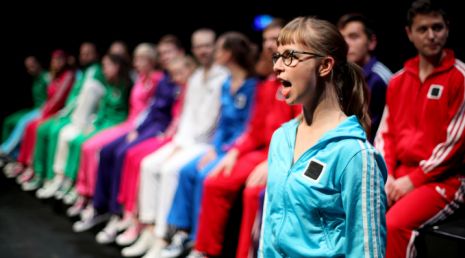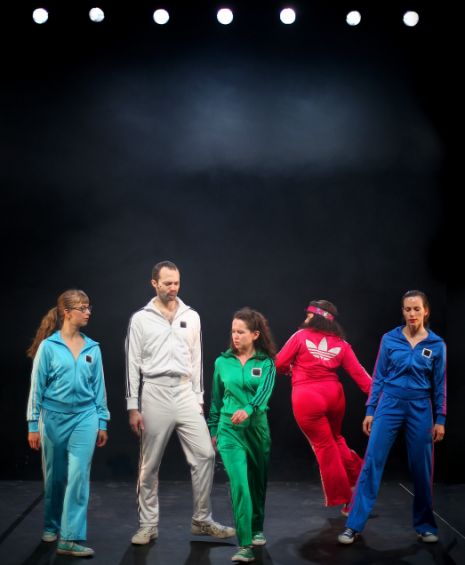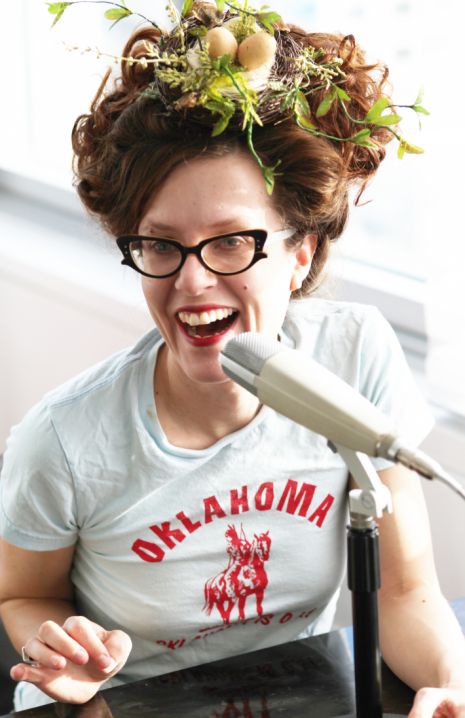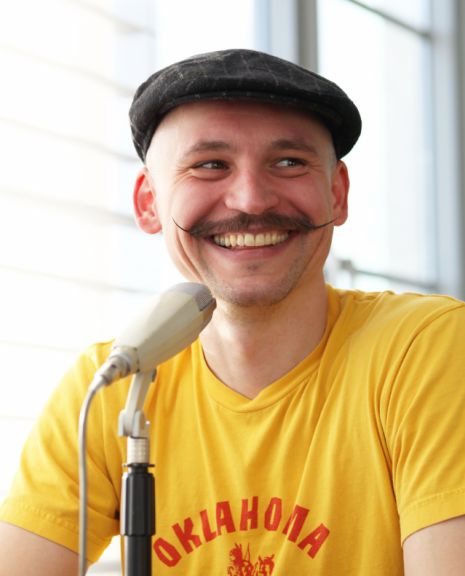Talk
In 2012 Copper and Liska started OK Radio, a podcast they make with local artists wherever they are performing. Here’s what Kelly wrote about OK Radio in their Alpert Award application: “It’s a chance to engage in a long-form dialogue with others about our mutual work and the purpose - or possible purpose - of art in the larger world. Why are we doing this? It’s been an important question for us to voice, and to try to answer – not to become complacent. We've been surprised by the depth and generosity of artists (even at the very top of their field) to join the discussion and let us post the audio online to share with others.”
We asked director and 2013 Alpert Theatre panelist Eric Ting* if he might sit down face-to-face to talk with Pavol and Kelly, and he generously agreed.
What follows are some excerpts of the 2 hour and 6 minute conversation. Taking editorial liberty here - slicing and transposing into text the already mediated quasi-naturalistic 96-page transcript of their conversation - has everything to do our perceptions about attention and the web page.
Pavol Liska: I want to reach a level of madness and insanity in these closets [where the OK Radio interviews, and this conversation took place]. That happens over time. That’s why it’s always long-form. We never agree to a short podcast because I don’t feel like it’s enough time to create anything real. It’s always about the process of creation. I’m not a NPR, you know, dude? It’s always a wrestling match. I’m sweating. Look at my armpits! It’s always a sweaty affair. It’s hot in here. It’s not comfortable. And you just have to have people who are willing to play, play that game.
So-called unedited.
Supposedly.
Well, the misconception is that it’s unedited. It is heavily edited.
But it’s not edited for clarity or purity or it’s not –
Beauty. It’s not –
Rewritten.
It’s not rewritten, and it’s not edited for conventional standards of beauty and poetry.
There are names changed. There are some sections that were moved. But they were moved in a way that this part will still get you to this part. I’m trying to make those things as seamless as possible. But of course, if we did every word it might actually be 48 hours.
Episode 1 is mostly unedited. It’s straight as it came out, right?
Yeah.
Okay, we’re done that. That was a challenge of that particular project. Then Episode 2: there are some repetitions; there have been chunks of text. Episodes 3&4 are a very different beast, much more shaped, and much more straightforward.
But still –
But it’s all – it’s always shaped. It’s always -- we’re looking at it: Is this enough? and - is this just enough?
Yeah.
Like I said, we both started as playwrights. We were both writing and writing and writing. Whenever I wrote, it was always very formal, you know, English being my second language. It was always formal. I always felt like it has to be formal. There’s no reason to make this all naturalistic. I was a playwright, but I was always running against these teachers that were telling me, ‘It sounds stilted and stiff.’ ‘No, shit! That’s how I write! It should sound stiff and stilted because I wrote it…It’s not Jesus who dictated it to me and I just took down natural sounding dialogue!’ So then it’s like, okay, if you want natural-sounding dialogue, let’s go to the source. Let’s not try to make it up and pretend that somebody’s making this up on stage, let’s just record the way people talk.
Then it was like: how do people actually talk? And how do we capture that? That was the writing process. We’re still writing. I mean, we consider it writing by having conversation. The writing happens in conversation.
But what happens, of course, when you get down to every single detail of what spoken language is - it does have its kind of own artificiality. Because we don’t experience it like that.
Listening is translation. And our job is then to un-translate, to unscramble. After we make these recordings with people, our job is not to then just transfer them onto the stage, and let people hear them as natural speech. Our job is then to unscramble and un-translate that. And to point out just how strange this sounds. How inarticulate we are, how difficult it is to actually communicate with each other. That’s really always the job. We’ve never just thrown the language up on stage: ‘Here! Enjoy how we speak!’ It’s always been a forceful, transformative, violent act of raping this language - that is recorded - that somehow came out spontaneously out of a person, or me, or Kelly, or whoever is involved in the recordings, and then try to really crank it up! Turn up the contrast and transform it. So that the audience can actually hear what we sound like. Because we don’t know what we sound like. We don’t hear ourselves.
And we don’t even hear each other, really because we simplify things. We translate things. We respond to things other than just words. We respond to emotions, we respond to tone of voice, we respond to so many different things - body language. And that - to us - is always even more important than just the words.
Andy Warhol’s work is definitely a big game-changer for us. All these conversations [the interviews] are modeled on his films. We’re here talking… Everything goes. But they [the interviews] are just these documents - these time capsules. That’s probably why we don’t edit so much.
We edit, but really we’re interested in creating sculpture. We’re sculpting time. How can you sculpt time? Sometimes you need a story, sometimes you need a dance, sometimes you need a sound event, sometimes you need all of these, but –
But it’s not as if we’re not considering editing! I think when we were first showing early No Dice, I can remember somebody coming up to me and saying: “Scissors. Scissors, guys.” You want to say, “I know! I know that that’s an option. But that’s not my option.
That’s not what we’re interested in.
It’s not what’s going to make it good.
We know that. Other people do scissors. We’ve seen scissors; we know what they do. There’s plenty of that. Ultimately we are looking for what’s missing. What’s missing? What’s not art yet? That’s really our number one goal.
Nature Theater of Oklahoma’s performances have run from X to X in length. The whole of the Life and Times series is a full twenty-four hours.
It’s trying to create an un-dismissible event, an un-dismissible experience. I love radio, obviously, but I haven’t had this all-intense life-transforming experience, because I can do other things while I listen to radio. Same with television. With films, the only time I’ve really had a - I’ve never had an all-transforming experience watching a film when it wasn’t a 13-hour marathon of some sort. Or staring at a single image for 45 minutes. Or 30 minutes of constant flicker. Where it wasn’t something that physically affected me. It’s trying to figure out a physical experience that maybe goes back to growing up as an athlete, and making a difficult experience for myself that will somehow transform me. Not a comfortable, not a palatable experience. Maybe it’s my limitation. I know that probably 95 percent of humans would much rather experience an 87 minute long movie, which is where it kind of solidified. If you make a movie that’s even 95 minutes, the executives in Hollywood will tell you, ‘No, no, you must cut the five minutes.’ If it’s a dance performance, and longer than an hour and five minutes, it’s too long. Somehow we have all put these time brackets on these events that somehow are comfortable. I understand! Most people, that’s what they want. But for me? I have never been transformed - and that’s physically and mentally and emotionally! - having those experiences. I just try to create the experiences for other people that have transformed me.
I do think that time, value and commitment are three things that are somewhat our subject matter. So what we’re asking for is more time than this - you know - than this subject deserves. More time than we deserve. We’re asking the audience to make a bigger commitment than they’re used to. That’s been the exciting thing about the marathon. It’s like: ‘I’m making a choice that’s somehow equal to the choice that the actors are making to do this.’ We’re making an equal investment in this experience. And then what we get out of it does grow in value based on those people’s commitment of their time.
I’m realizing that it’s a kind of great process to get the audience and the actors to the same place of exhaustion. You get to this place where both the performers and the audience are more open, and more exposed. We can do things like experience stillness together, or experience tiredness together. Constantly as we’ve been working on this, we’re thinking: ‘what time of night is this? Are people hungry?’ You’re forced to deal with the human body on a kind of biological level.
If the show is two hours long, it’s a little too long for a normal show but not long enough to actually be inconvenient. Not enough to actually stretch you. Not enough to actually push you into absolute hatred or absolute love. What we want is for the audience to go into extremes. We’re only interested in the extremes. Doing the individual shows [in contrast to a series] is not extreme enough to produce whatever it needs to produce. They’re just rehearsals really.
I think one of the great things that you do is by turning on the lights [in the theatre] and by the way the actors stare at us, and the way that they receive information from us, you’re also simultaneously making us vividly aware of our response to what is happening.
Yeah.
We are constantly sort of self-aware. We can’t disappear into the darkness.
Nope.
We make the shows and hopefully people need them. We’re always questioning, ‘Do people need them? Is it necessary?’ We’d be perfectly okay if we found out that this is not necessary. We would look for what is necessary. The reason we are doing these podcasts and getting really into radio is because I feel like it’s necessary for us to talk to other people - to connect - and it’s necessary for people to hear that, and for people to engage with each other, and with each other’s work on a different level, on a deeper level than we have been doing so far.
We want to make that doubt and questioning that we have about the necessity of theater somehow communicable to [the audience.]”
And we’re trying to frustrate their enjoyment, frustrate their sinking into just perceiving [the work] as an aesthetic object.
I’m not making an aesthetic object for them. You know, this is an experience that we’re all having.
Everything in our work needs to be unbalancing and unbalanced, including the audience, including the stage.
Our shows are part of a conversation, and we try to make as clear a statement and as bold a statement as we can possibly do to unbalance you. And you make your own statement as a response to that, and then I can make the next statement. But I need your statement in order for me to make my second statement. It’s continuous.
It’s not a conclusion I’m leading you to.
There has to be a level of insanity for you to agree to do what we want you to do. There has to be a level of insanity for you to agree to do what we want to do. We look for madness. Because if you’re too rational, and too practical, and too caught up in the ordinary world, you’ll never see the purpose of what we’re after. Which is enlightenment. Which is the highest possible religious experience that you could have as a human being.
I know that what we do is ridiculous, that no one would care tomorrow if we stopped making it, but I always hope that what we do changes people’s lives, that it alters consciousness, that it cures cancer and AIDS. I know I am failing miserably at any one of these goals, but I have to keep striving for big things when I invite all these people into a room. I have to believe in the power of that encounter.
Pavol feels the same way. In his country, theater people were the ones behind the Velvet Revolution. It was Václav Havel and a bunch of theater people who were changing the world, and they overthrew the government and started again. This is the tradition we’re always trying consciously to work from.
The show is just a pretext. The story that we recorded is just a pretext for something better, greater to happen. We know the story is not that great. We know the choreography is not that great. We know that the singing is not that great…. So, if know all of these things - then what are we after? That just gets you in the room. As when we did Romeo and Juliet, we know – we’re not trying to do Romeo and Juliet. Who cares? I don’t care. We know [the title] tricks people to come in. Somehow we’ve just got to get them in! And then when we get them in, then what do we do?
That’s our job. It’s like: ‘Oh, shit! We tricked them.’ It’s a con. It’s all a lie! It’s a con just to get people in the room.
It’s a serious con.
Absolutely, it’s an existential, cosmic - it’s a cosmic con! And our interest is then to make the most of it while everybody has agreed to be in the room. If they need to reconnect with the story, that’s there. It’s familiar…
You know, they can connect. But ultimately we’re not trying to make sure that everybody can have their life reflected back to them. That’s not what we’re after. What we’re after is having some kind of transformative experience where all of your potential is being used.
The story itself refuses to be an aesthetic object in the same way that the actors do. It’s a resistance. It’s not a seductive object.
All that said - we are showbiz people. We know how to do it, and there are elements of seduction, there are elements of virtuosity.
We all know what we’re doing; we know how to do it well. But I guess - having quit before, you quit something, and you come back to it, it’s like: ‘Okay, I know how to do that. I can use the skills that I have to do this.’ But really, I’m after something else. There is a kind of disillusionment.
It feels like a very fragile time for us, just in the fact that we’re questioning so much and I feel like with [Episodes] 1 through 4 [of Life and Times,] we got to a moment where we reached an end point of performance. For now. And we had to go into different formats. That’s always like – ha! - when that hermit crab gets rid of its shell, and it’s all soft and it’s looking for a new home. Really, that’s us right now.
We are soft-shelled crabs.
Yeah. There are birds circling overhead, you know?






